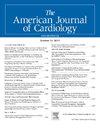Assessment of Genetic Variants Linked to Susceptibility to Mechanical Prosthetic Valve Thrombosis
IF 2.3
3区 医学
Q2 CARDIAC & CARDIOVASCULAR SYSTEMS
引用次数: 0
Abstract
Prosthetic valve thrombosis (PVT) is a critical and life-threatening condition driven by multifactorial etiologies, including genetic predispositions. The study was designed as a single-center retrospective manner. Echocardiographic features and genetic test including factor II/prothrombin (G20210A), factor V Leiden (G1691A), factor V R2 (A4070G), apolipoprotein (Apo) B-100 (G10708A), ApoE (C112R), ApoE (R158C), methylenetetrahydrofolate reductase (MTHFR) C677T, MTHFR A1298C, factor XIII G103T (V34L), β-fibrinogen (455G>A), PAI-1 4G/5G, and HPA-1 GPIIIa (T196C) genotyping variations were assessed. We performed genetic tests on 175 patients with PVT (biologically women [n = 124, 70.9%], with a mean age of 49.8 ± 13.1 years) and 101 patients (biologically women [n = 57, 56.4%], with a mean age of 54.7 ± 13.6 years) without thrombus formation. The thrombosis group was significantly younger compared with controls (p = 0.004). The percentage of patients with mechanical aortic valves was significantly lower in the thrombosis group compared with controls (22.3% vs 34.7%, p = 0.025). A significant difference was observed between the thrombosis and control groups regarding the genotype ratios of factor II/prothrombin (G20210A) (heterozygous, 6.8% vs 1%, p = 0.043) and HPA-1 GPIIIa (T196C) (homozygous mutant, 7.8% vs 0%, p = 0.034). In addition, there was a significant association of heterozygous MTHFR (A1298C) variation with obstructive thrombosis compared with nonobstructive thrombosis (46.9% vs 29.2%, p = 0.046). In conclusion, this is the first study to report a potential association between genetic variants, including HPA-1 GPIIIa (T196C), factor II/prothrombin (G20210A), MTHFR (A1298C), and PVT, necessitating extensive further research and additional clinical consideration.
评估与机械人工瓣膜血栓形成易感性相关的基因变异。
人工瓣膜血栓形成(PVT)是一种危及生命的严重疾病,由包括遗传倾向在内的多因素病因引起。本研究采用单中心回顾性研究方式。超声心动图特征和基因检测包括因子 II 凝血酶原 G20210A、因子 V Leiden G1691A、因子 V R2 A4070G、载脂蛋白 B-100 G10708A、载脂蛋白 E C112R、载脂蛋白 E R158C、载脂蛋白 E C112R、载脂蛋白 E R158C、我们还评估了 MTHFR C677T、MTHFR A1298C、因子 XIII G103T (V34L)、β 纤维蛋白原 G-455A、PAI-1 4G/5G 和 HPA-1 (GPIIIa) T196C 的基因分型变异。我们对 175 名 PVT 患者(生物学上为女性(124 人,占 70.9%),平均年龄为 49.8 ± 13.1 岁)和 101 名未形成血栓的患者(生物学上为女性(57 人,占 56.4%),平均年龄为 54.7 ± 13.6 岁)进行了基因检测。与对照组相比,血栓形成组明显更年轻(P=0.004)。与对照组相比,血栓形成组患有机械主动脉瓣的患者比例明显较低(22.3% 对 34.7%,P=0.025)。血栓形成组与对照组在因子 II/凝血酶原(G20210A)(杂合子,6.8 vs 1%,p=0.043)和 HPA-1 GPIIIa(T196C)(同基因突变,7.8 vs, 0%, p=0.034)此外,与非阻塞性血栓形成相比,杂合子 MTHFR (A1298C) 变异与阻塞性血栓形成有显著关联(46.9 vs 29.2%, p=0.046)。总之,这是第一项报告 HPA-1 GPIIIa (T196C)、因子 II/凝血酶原 (G20210A)、MTHFR (A1298C) 等遗传变异与 PVT 之间潜在关联的研究,因此有必要进行广泛的进一步研究和更多的临床考虑。
本文章由计算机程序翻译,如有差异,请以英文原文为准。
求助全文
约1分钟内获得全文
求助全文
来源期刊

American Journal of Cardiology
医学-心血管系统
CiteScore
4.00
自引率
3.60%
发文量
698
审稿时长
33 days
期刊介绍:
Published 24 times a year, The American Journal of Cardiology® is an independent journal designed for cardiovascular disease specialists and internists with a subspecialty in cardiology throughout the world. AJC is an independent, scientific, peer-reviewed journal of original articles that focus on the practical, clinical approach to the diagnosis and treatment of cardiovascular disease. AJC has one of the fastest acceptance to publication times in Cardiology. Features report on systemic hypertension, methodology, drugs, pacing, arrhythmia, preventive cardiology, congestive heart failure, valvular heart disease, congenital heart disease, and cardiomyopathy. Also included are editorials, readers'' comments, and symposia.
 求助内容:
求助内容: 应助结果提醒方式:
应助结果提醒方式:


